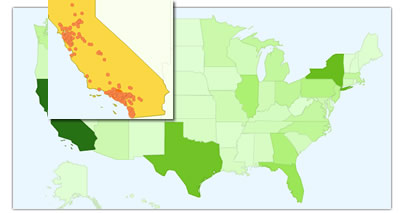
B2B Articles - Aug 21, 2011 12:45:43 PM - By Ironpaper
Certainly, location-based web advertising is going to be a true mover-and-shaker for the world of internet business. It may unlock a new and creative ways to improve and tighten ROI. It could even help restore some strength back to mom-and-pop shops by providing them access to a regional customer base.

The potential of web location-based advertising is yet to be realized, but that potential seems to be on the horizon with services like Groupon and Facebook. Already, using Facebook, StumbleUpon, Adwords or LinkedIn advertising systems, an advertiser can focus-in on a specific location with some measure of accuracy.
Advertisers dream of a day when a mobile phone user (potential customer) walks by a Starbucks (or a small-time, mom-and-pop bakery) and the user receives a coupon for a free thing-y when you buy another thing-y (or some other type of promotional). The goal here is to influence people at the right time of influence--when they are close to making a purchase.
The mobile internet, using GPS, holds that promise for advertisers and location-specific businesses.
The problem of location-based advertising is consumer privacy. Customers are spooked when companies know too much about them. Ultimately customers want and need to control their own information--such control is their gateway to a sense of security. For mobile location-based advertising, the current obvious challenge is to serve up such advertising without compromising that information privacy.
Many industry strategists are expecting the ability to make identity data anonymous to be the answer. More specifically, applications would use data that has encrypted personal details or access data with the personal details omitted prior. There would need to be an inherent sense of trust with the filtering application or process. We have already seen very public violations of trust with personal data (Facebook and Google come to mind), which will make consumers wary of allowing the advertising platforms to become that filtering / protection apparatus. The incentive of a ad platform company is to make customer data usable--as much customer data as possible. In order to make location-based advertising possible, we will need an advocate for the consumer/user--this application or process will need some measure of trust and transparency and user-control in order to allow advertisers to harness the power that location-based ads can hold .